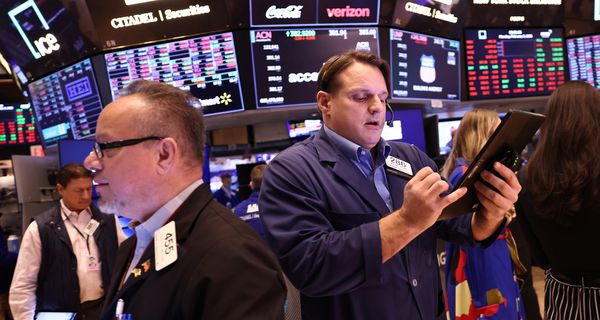2025 Market Volatility: Stocks Close Lower Amid Tariff Uncertainty
The US stock market experienced a tumultuous session on Monday, with major indexes closing lower despite a significant rebound from early-session lows. The market’s downturn was largely driven by the ongoing tariff saga, as investors continued to assess the implications of the US-Mexico trade dispute.
Key Market Metrics:
– The S&P 500 index fell 0.8% to close at 4,321.23
– The Nasdaq Composite index declined 1.2% to end at 13,414.51
– The Dow Jones Industrial Average slipped 0.3% to finish at 34,511.19
Tariff Uncertainty Weighs on Market Sentiment:
The market’s initial downturn was triggered by news that the US would impose tariffs on imports from Mexico, effective Tuesday. However, in a surprise move, President Donald Trump announced that the tariffs would be delayed by a month, following an agreement with Mexican President Claudia Sheinbaum. The delay provided a temporary reprieve for investors, but market sentiment remains cautious amid ongoing trade tensions.
Tesla and Nvidia Lead Decliners:
Tesla, Inc. (TSLA) was among the biggest decliners, with its stock plummeting 5.6% to close at $1,432.92. Nvidia Corporation (NVDA) also experienced a significant decline, with its stock falling 4.1% to end at $523.21. Other notable decliners included (link unavailable), Inc. (AMZN), Microsoft Corporation (MSFT), and Alphabet Inc. (GOOGL).
Investors Remain Cautious:
As the market continues to navigate the complexities of the US-Mexico trade dispute, investors remain cautious. The delay in tariffs provides a temporary reprieve, but the ongoing uncertainty surrounding trade policy continues to weigh on market sentiment. With the Federal Reserve’s latest decision on interest rates and corporate earnings season still unfolding, investors will be closely monitoring market developments in the coming days.
What’s Next for the Market:
As the market looks ahead to the next trading session, investors will be closely watching for any developments on the trade front. The delay in tariffs provides a temporary reprieve, but the ongoing uncertainty surrounding trade policy continues to weigh on market sentiment. With the Federal Reserve’s latest decision on interest rates and corporate earnings season still unfolding, investors will be closely monitoring market developments in the coming days.
EXCERPT
2025: Stocks Close Lower as Investors Assess Tariff News; Tesla Down Sharply, Nvidia Slump Continues
By Stephen Wisnefski
Updated February 03, 2025
06:58 PM EST
Traders work on the floor of the New York Stock Exchange during morning trading on February 03, 2025
Traders work on the floor of the New York Stock Exchange during morning trading on February 03, 2025.Michael M. Santiago / Getty Images
25 Highest Paid Occupations in the USMajor U.S. stock indexes closed lower Monday, though up substantially from early-session lows following news that U.S. tariffs on imports from Mexico would be delayed by a month.
The S&P 500 and the Nasdaq Composite fell 0.8% and 1.2%, respectively, while the Dow Jones Industrial Average slipped 0.3%. Stocks were coming off a volatile week of trading fueled by corporate results, the Federal Reserve’s latest decision on interest rates, the revelation that Chinese startup DeepSeek had launched a highly effective, low-cost AI model and uncertainty about trade policy.
Stocks fell sharply early Monday after President Donald Trump over the weekend signed executive orders calling for 25% tariffs on Canada and Mexico, and 10% tariffs on China, all of which were due to go into effect early Tuesday. News of the pause in the tariff order on Mexico helped stocks recover, and soon after the close of trading the U.S. reached a similar agreement with Canada to postponse implementation by 30 days.
Investors are concerned that tariffs could have a damaging effect on various U.S. industries, while also spurring inflation that could keep the Fed from cutting interest rates this year.
“In the weeks ahead, tariffs are likely to represent an overhang on markets and contribute to volatility, at least until investors gain greater clarity on the path and destination of US trade policy,” UBS Global Wealth Management Chief Investment Officer Mark Haefele said before news of the postponed implementation of tariffs.
Shares of automakers were among those that took a hit on Monday amid concerns about the potential impact of tariffs. General Motors (GM) and Toyota Motors (TM) both fell about 3%, while Stellantis (STLA) slid nearly 4%.
Electric vehicle maker Tesla (TSLA) shed 5.2% leading a broader downturn for mega-cap tech stocks. AI chipmaker Nvidia (NVDA) and Apple (AAPL) fell 2.8% and 3.4%, respectively, while Alphabet (GOOGL), Microsoft (MSFT), Amazon (AMZN) and Broadcom (AVGO) also lost ground. Meta Platforms (META) gained 1.2%.
Palantir (PLTR) shares gained 1.5% ahead of the release after the closing bell of the analytics software provider’s quarterly results. Shares soared more than 20% in after-hours trading following a better-than-expected earnings report.
Bitcoin, which had fallen as low as $91,000 on Sunday as investors responded to the tariff news by selling riskier assets, jumped to $101,500 in recent trading.
The yield on 10-year Treasurys, which is sensitive to investor views on the economic outlook, was at 4.55% late Monday, down from Friday’s close of 4.57% but up from an intraday low of 4.46%.
Gold futures were up 0.6% at around $2,850, near a new record high, while WTI crude oil futures rose 0.3%.
What Analysts Think of Alphabet Ahead of Earnings Tuesday
2 hr 41 min agoGoogle parent Alphabet (GOOGL) is slated to report its fourth-quarter results after the market closes Tuesday, with analysts mostly bullish on the tech giant’s stock.
Of the 19 analysts covering the stock tracked by Visible Alpha, 15 have issued “buy” or equivalent ratings, with four “hold” ratings. Their consensus price target is about $219.
Alphabet shares fell 1.4% to close Monday at around $201. The stock has gained 41% over the past 12 months, handily outpacing the S&P 500’s gains over the period.
Alphabet (GOOGL) vs S&P 500 over the past 12 monthsTradingView
Alphabet is expected to report fourth-quarter revenue of $96.6 billion, up 12% year-over-year, and earnings of $26.19 billion, or $2.12 per share, up from $20.69 billion, or $1.64 per share, a year earlier.
Jefferies recently maintained a “buy” rating and $235 price target for the stock, writing that Alphabet’s “fundamentals appear to be improving with solid ad spend,” and that the company is seeing growing demand for Google Cloud.
The tech giant’s spending on AI will also likely be in focus after the emergence of a sophisticated, cost-efficient AI model from Chinese startup DeepSeek raised concerns about the competitiveness of U.S. firms and their spending on the emerging tech.
Bank of America analysts told clients in a note Friday that they view last week’s strong results from Meta (META), which stood by its AI spending plans, as a positive signal for Alphabet.
Earlier in the week, Raymond James and Bank of America analysts also suggested that DeepSeek’s rapid rise could push the tech giant to act with greater urgency on AI developments.
Biggest S&P 500 Movers on Monday
3 hr 25 min agoDecliners
Shares of Moderna (MRNA) tumbled 7.3%, losing the most of any stock in the S&P 500. Monday’s decline extended losses posted late last week when Goldman Sachs downgraded the biotech firm’s stock to “neutral” from “buy.” The downgrade came after the vaccine maker reduced its product revenue guidance for the second time in six months, leading analysts to believe that Moderna has limited visibility into the sales trajectory of its respiratory vaccine business. Goldman’s team also predicted that, given elevated operating expenses, Moderna will not break even on a cash basis until 2029, beyond the company’s updated 2028 target.
Franklin Resources (BEN) shares fell 6.9%, giving back some of the strong gains posted last week after the investment management firm posted better-than-expected profits for its fiscal first quarter. Despite the strong bottom-line performance, revenue fell short of estimates, and Franklin reported a decline in assets under management (AUM), reflecting an impact from elevated net outflows. Bank of America slightly raised its price target on Franklin Resources shares to account for updated earnings estimates, but analysts maintained their “underperform” rating on the stock.
FedEx (FDX) shares dropped 6.6% after Loop Capital downgraded the shipping company’s stock to “hold” from “buy” and lowered its price target. The decreased outlook for the package delivery company came as Loop analysts downgraded the entire U.S. transportation sector following the White House’s tariff announcement, noting that the new trade policies could pressure transportation volumes and increase prices.A pair of FedEx trucks wait to transport a pair of 3 year old Giant Pandas, Bao Li and Qing Bao, after they arrive on a FedEx Boeing 777 plane from China at Dulles International Airport on October 15, 2024
FedEx trucks wait to transport a pair of 3-year-old giant pandas after they arrive on a FedEx Boeing 777 plane from China at Dulles International Airport, on October 15, 2024.Kent Nishimura / Getty Images
Tesla (TSLA) shares tumbled 5.2% as investors weighed the implications of Trump’s tariff policies. The electric vehicle (EV) maker could see an impact from shifts in the global trade environment and potential retaliatory moves in response to the tariffs, especially given Tesla’s exposure to markets in China as well as its close ties to the U.S. presidential administration. A report showing a downturn in registrations for Tesla vehicles in Norway and Sweden during January also raised concerns about perceptions of the brand in Europe.
Advancers
IDEXX Laboratories (IDXX) shares posted Monday’s best performance in the S&P 500, surging 11.1% after the provider of veterinary healthcare products and services reported better-than-expected sales and profits for the fourth quarter. Growing demand for the company’s animal testing offerings helped drive the strong performance, especially in the Companion Animal Group (CAG) segment, where IDEXX provides diagnostic tests, lab services, and platforms for managing veterinary practices.
Molina Healthcare (MOH) shares advanced 4.8%. The managed care company is prepared to release its quarterly earnings report after the closing bell on Wednesday. Analysts anticipate that Molina’s sales and profits will be significantly higher compared with the year-ago period, noting that the low-income populations served by the company could contribute to the growth.
A slew of investment research analysts lifted their price targets on AbbVie (ABBV) stock following last week’s earnings release. The pharmaceutical firm topped fourth-quarter revenue estimates, boosted by sales growth from its anti-inflammation treatments Skyrizi and Rinvoq, and AbbVie increased its long-term sales outlook for the two drugs. AbbVie shares advanced 3.4% on Monday.-Michael Bromberg
Palantir Pops on Strong Outlook Amid AI Boom
4 hr 10 min agoPalantir’s (PLTR) fourth-quarter revenue and outlook for 2025 topped analysts’ expectations, news that sent shares soaring in extended trading Monday.
The analytics software provider’s revenue grew 36% year-over-year to $828 million, surpassing the analyst consensus from Visible Alpha on strong demand for the company’s Artificial Intelligence Platform.
Earnings came in at $79.01 million, or 3 cents per share, down from $93.39 million, or 4 cents per share, a year earlier, and below expectations, thanks in part to one-time expenses related to stock appreciation rights. However, earnings after adjustment jumped 80% to $341.95 million, or 14 cents per share, topping the analyst consensus.
“Our business results continue to astound, demonstrating our deepening position at the center of the AI revolution,” said Palantir CEO Alex Karp in a release.
Palantir said it anticipates 2025 revenue of $3.74 billion to $3.76 billion, above the analyst consensus of $3.51 billion.
Shares of Palantir surged more than 20% in extended trading Monday following the release. The stock closed at a record high of $83.74 Monday and has quintupled in value over the past 12 months
-Andrew Kessel
Why Tesla Tumbled After Trump Tariffs
4 hr 53 min agoTesla (TSLA) was the worst-performing Magnificent Seven stock on Monday, falling more than 5%, after President Trump moved to impose stiff tariffs on America’s largest trading partners.
The automotive industries of the U.S., Canada, and Mexico, are deeply intertwined; Tesla vehicles, despite being assembled in the U.S., contain parts from Canada and Mexico.
Tesla, SpaceX and X CEO Elon Musk arrives to speak during an inauguration event at Capital One Arena.
Tesla CEO Elon Musk speaks at an event for the inauguration of President Donald Trump, in Washington, DC, on January 20, 2025.Christopher Furlong / Getty Images
Some Canadian officials have proposed directing retaliation at President Trump and his allies, including Tesla’s CEO Elon Musk and Republican-led states.
Read the full article here.
-Colin Laidley
Nvidia Levels to Watch as Stock Continues to Slump
5 hr 50 min agoNvidia (NVDA) shares fell again Monday, adding to the stock’s steep losses last week that were fueled by concerns related to Chinese startup DeepSeek’s low-cost AI model.
The losses on Monday came as the Trump administration said it would impose tariffs on leading trading partners, which has prompted concerns of a broader global trade war that could see countries introduce counter measures on items, including American AI chips.
Nvidia shares were down 2% at around $118 in late trading Monday, after falling 16% last week following the revelation of DeepSeek’s success, which sparked worries that Big Tech’s investment in the chipmaker’s pricey AI offerings could wane. Nvidia shares have lost nearly a quarter of their value since hitting a record high in early January but are still up about 80% over the past 12 months.
This image depicts the NVDA chart.
Source: TradingView.com.Nvidia shares broke down below a seven-month rising wedge pattern last week on the highest trading volume since August 2023, suggesting institutional selling participation.
Moreover, the relative strength index (RSI) fell below the 50 threshold to its lowest level since December 2022, confirming increasing selling momentum.
Investors should watch key support levels on Nvidia’s chart around $96, $76, and $50, while also monitoring important resistance levels near $130 and $150.
Read the full technical analysis piece here.
-Timothy Smith
Manufacturing Expansion Threatened by Higher Tariffs
7 hr 3 min agoThe manufacturing sector had its best month in more than two years in January. However, the improvement was not enough to soothe economists’ worries about the effects of President Donald Trump’s trade policies on the manufacturing industry.
The Institute of Supply Management manufacturing sector Purchasing Managers’ Index for January moved above the 50% line for the first time in 26 months, indicating economic expansion in the sector.
The 50.9% reading comes in higher than last month’s 49.2% result and is slightly more than predictions from economists surveyed by The Wall Street Journal and Dow Jones Newswires.
But the results don’t factor in Trump’s move to levy tariffs on Canada and China beginning Tuesday and tariffs on Mexico next month. The three countries represent about 40% of U.S. imports.
“The manufacturing sector continued its positive momentum in January, but we expect this will be short-lived due to the trade war initiated by President Trump over the weekend,” said Matthew Martin, senior U.S. economist at Oxford Economics. “Our initial modeling suggests markedly lower demand for goods, higher inflation, and higher interest rates—all of which will weigh on the nascent upturn in manufacturing.”
-Terry Lane
Goldman Analysts Say Tariffs Could be 5% Blow to S&P 500
8 hr 10 min agoGoldman Sachs analysts modeled out how the tariffs could impact U.S. markets, and estimated the levies may reduce the S&P 500’s fair value by roughly 5%.
Tariffs, they explained, will either shrink U.S. profit margins by raising input costs or, if higher costs are passed on to consumers, slow sales. “We estimate that every 5pp increase in the US tariff rate would reduce S&P 500 EPS by roughly 1-2%. As a result, if sustained, the tariffs announced this weekend would reduce our S&P 500 EPS forecasts by roughly 2-3%,” the analysts wrote in a note Sunday.
In addition, tariffs are expected to support U.S. dollar strength. International sales account for about 28% of the S&P 500’s revenue, and a stronger dollar eats into the value of those sales. Though, the analysts note, the dollar’s impact on earnings may be limited given Canada and Mexico account for less than 2% of the S&P 500’s sales.
The tariffs have amplified economic and political uncertainty, threatening to undercut Wall Street’s appetite for risk. According to Goldman, the U.S. Economic Policy Uncertainty Index on Friday jumped to 502, its highest level since March 2020. Historically, this level of uncertainty has translated to a 3% reduction in the S&P 500’s forward P/E ratio.
Since tariffs could both stoke inflation and weigh on economic growth, their impact on Treasury yields, especially on the long-term bonds that have the biggest effect on stocks, is expected to be minimal.
-Colin Laidley
What Wall Street Thinks of Palantir Ahead of Earnings Monday
9 hr 29 min agoPalantir Technologies (PLTR) is set to report fourth-quarter results after the market closes Monday, with analysts largely skeptical on whether the analytics software provider’s stock can sustain its recent momentum.
None of the 13 analysts covering the stock tracked by Visible Alpha expect the stock has further to rise, with their consensus price target of $50 is about 40% below its current level.
The stock was down 0.5% at around $82 in midday trading Monday. Palantir shares have gained nearly 400% over the past 12 months as demand surged for the company’s AI products.
Palantir stock price chart since start of 2024TradingView
Wedbush analysts, who are more bullish on the stock than others polled by Visible Alpha, recently raised their price target to $90 from $75, and said they believe Palantir “has a path to become the next Oracle or Salesforce over the coming years,” adding they believe Wall Street is underestimating the revenue potential of Palantir’s Artificial Intelligence Platform.
However, others like Jefferies, which on Thursday maintained an “underperform” rating and price target of $28, have suggested the stock is trading at such a high premium that “any signs of decelerating growth could cause concern.”
Palantir is expected to report fourth-quarter revenue of nearly $775 million, up 27% year-over-year, and earnings of $83.51 million, or 3 cents per share, down from $96.91 million, or 4 cents per share, a year earlier. Earnings after adjustment are expected to rise 35% to $273.79 million, or 11 cents per share.
In the third quarter, Palantir reported better-than-expected results and raised its revenue guidance for the last quarter of the year.
-Andrew Kessel
Stocks to Watch in February
10 hr 6 min agoStocks rose in January, boosted by encouraging inflation data, optimism about President Donald Trump’s pro-business agenda, and the announcement of a major AI infrastructure investment.
But the month wasn’t without its road bumps. The Trump administration roiled markets on the last day of the month with his plan to move forward with tariffs against China, Canada, and Mexico, three of America’s largest trading partners. Plus, tech investors were caught off guard by the release of a surprisingly efficient Chinese AI model that raised questions about the competitiveness of American models and the wisdom of Silicon Valley’s massive spending.
Among the stocks that investors should keep a close eye on this month: Nvidia (NVDA), Palantir (PLTR), AppLovin (APP), Allstate (ALL) and oil majors ExxonMobil (XOM) and Chevron (CVX).
Read the full article here.
-Colin Laidley
Constellation Brands Sinks as Tariffs May Hit Beer Sales
10 hr 44 min agoAmong the companies feeling the impact of the tariffs announced over the weekend is alcoholic beverage giant Constellation Brands (STZ).
Shares of the firm that imports Modelo and Corona beers from Mexico were down nearly about 2% in recent trading after falling as much as 8% earlier in the session.
The potential impact of the sanctions led Piper Sandler to downgrade the stock to “neutral” from “overweight,” and slash the price target to $200 from $245, according to reports.
Sales of Mexican beer have been a big driver of Constellation Brands’ recent results. Its Modelo Especial overtook Anheuser-Busch InBev’s (BUD) Bud Light as the U.S.’s best-selling beer in 2023.
Last month, Constellation Brands reported a 3% year-over-year rise in beer sales in its fiscal 2025 third-quarter results, but wine and spirits revenue slumped 14%. It also lowered its full-year outlook, warning that it sees more “normalized spending” by consumers in the future.
Constellation Brands stock price chart since 2020TradingView
Constellation Brands shares sank to their lowest level in more than four years this morning.
-Bill McColl
Bitcoin Levels to Watch as Price Drops on Tariff News
11 hr 42 min agoBitcoin (BTCUSD) has tumbled over concerns about the potential impacts of U.S. tariffs imposed on products coming from Canada, Mexico and China.
The cryptocurrency’s price has carved out two peaks around the same level between December and January, potentially forming a double top, a classic chart pattern that signals a downside reversal.
Source: TradingView.com.Investors should monitor crucial support levels on bitcoin’s chart around $92,000, $87,000, and $74,000, while also monitoring a key overhead area near $106,000.
Bitcoin was trading around $96,000 recently, down from last week’s highs of around $106,000.
Read the full technical analysis piece here.
-Timothy Smith
Major Indexes on Track for Lower Open
12 hr 50 min agoFutures tied to the Dow Jones Industrial Average were down 1.3%.
DJIA futures – Feb. 3, 2025
Source:Inestopedia





